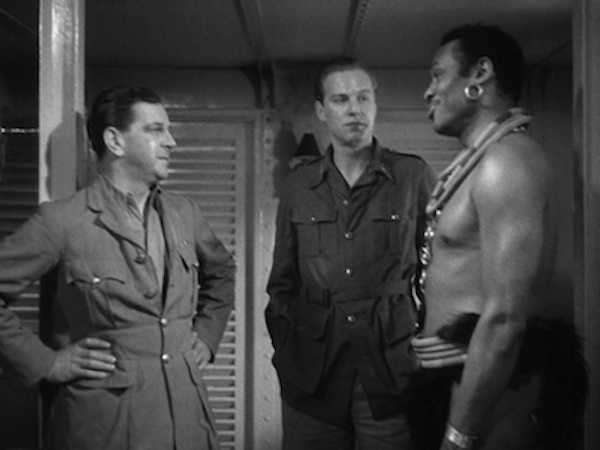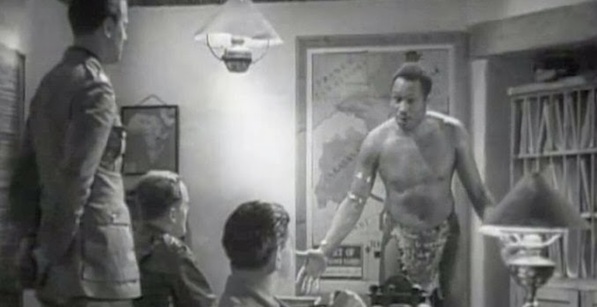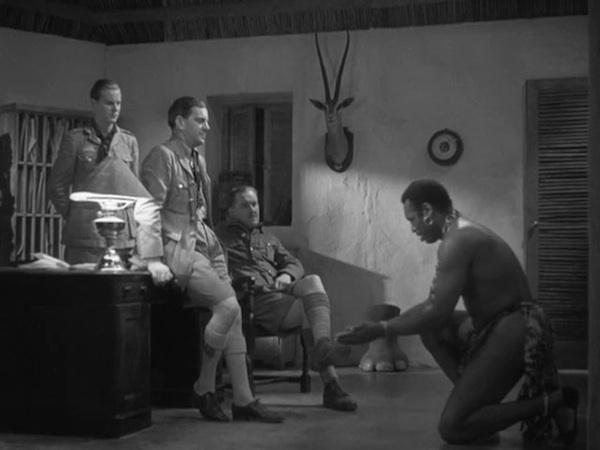[Editor’s note: Fandor and Hulu bring selections from the Criterion Collection to the service today, and Criterion titles will be continue to be published in thematic groups. Our current featured group is “Expeditions,” which includes not only Sanders of the River but also Burden of Dreams, The Four Feathers, Gold Rush, Letter Never Sent, The Wages of Fear and Woman in the Dunes.]
In an era where actors like Will Smith and Denzel Washington are among the biggest movie stars in the world, it may be hard to grasp just how big a deal it was a half-century ago when Sidney Poitier was the very first African American to become a bona fide Hollywood “name.”
Sure, Hattie McDaniels had won an Oscar for Gone With the Wind; but that was for yet another of the comic-relief servant roles that she and other black actors were largely delegated to for decades. Gorgeous, talented Lena Horne won a long-term MGM contract, but they found dismayingly little for her to do, the final insult being that when an ideal role came up for her in a1951 version of interracial musical drama Show Boat, the studio preferred to cast white actress Ava Gardner (in dusky makeup, her singing dubbed) rather than risk alienating Southern audiences with an actual black singer-actress in a non-stereotypical black role. For several decades low-budget “race movies” were made with all-black casts, playing segregated theaters, but they were virtually ignored by the mainstream. Poitier was the first African American actor commanding the box-office pull and popular respect (complete with an Oscar) that enabled him to star in movies of his own choosing.
In 1979, when he’d largely given up acting to direct, he narrated an Academy Award-winning short about a performer who’d blazed the trail his own career followed to a triumphant destination. But the world hadn’t yet been ready for Paul Robeson, and among the many art forms he worked in, cinema provided perhaps most bitterly frustrated his hopes to elevate the image of African Americans.
There’s no better illustration than Sanders of the River, a 1935 British spectacular that the already-famous American singer and actor eagerly signed on for, only to disown the much-compromised final result as an insult to his race.
Son of a Princeton, New Jersey minister, Robeson seemed destined for great things from an early age. Valedictorian and star footballer of his 1919 Rutgers class, then a law school graduate, he found himself swept to wider fame on the stage, most notably playing the demanding titular role in Eugene O’Neill’s play “The Emperor Jones.” His distinctive, sonorous bass voice won him a recording contract and concert tours as he continued to play high-profile stage roles in both the U.S. and England. (He refused offers to perform opera at the time, as unlike the traditional black spirituals or show tunes he sang, that European form had no relation to his cultural heritage.) A 1933 film of The Emperor Jones film won him further kudos, though he was uneasy over substantial changes imposed on the material.
That was nothing, however, compared to the problems he’d have with Sanders. At first glance it seemed a chance to offer a dignified portrayal of a tribal chief under colonialist rule, something that particularly appealed as Robeson had become deeply invested in exploring African history and culture. (He even published an essay at the time titled “I Want to Be African.”) His character Bosambo was a warlord in U.K.-ruled Nigeria who effectively safeguards his people until a neighboring territory’s King Mofolaba (Tony Wane), thinking the protagonist’s British Army protector (Leslie Banks as Commissioner Sanders aka “Lord Sandy”) dead, decides to lead a bloody raid.
Playing Bosambo’s bride was another superb African American singer-actor, Nina Mae McKinney, who had starred in pioneering 1929 all-black musical Hallelujah. The film would be largely location-shot by the Hungarian-emigre Korda brothers Zoltan and Alexander, who’d triumphed with such prestige productions as The Scarlet Pimpernel and 1933 Oscar winner The Private Life of Henry VIII.
But Robeson’s expectations were dashed when, he said, the script underwent drastic revisions in the last days of shooting. Scenes were added that revealing Bosambo’s “real” identity as a cunning gunrunner and prison escapee who simply took advantage of the natives’ gullibility to seize a leadership role. While the bulk of the film was somewhat condescending already, these new sequences really underlined a view of African tribal people as “wild beasts” (at worst) and “misguided children” (at best) in need of “civilized” white minders acting “like a father.”
It was precisely the opposite of what the star had hoped for. Apparently producer Alexander Korda, a staunch “Rule Brittannia”-type political conservative, had felt the movie insufficiently shored up the waning British Empire. Though brother Zoltan (who directed) was an ardent Socialist, his Tory brother ultimately called the shots. It was surely Alexander who insisted on an opening dedication to those “handful of white men whose everyday work [managing African colonies] is an unsung saga of courage and efficiency.”
Robeson was mortified, decrying the finished film as imperialist nonsense. He reportedly walked out on the film’s London premiere. Just before World War II, he noted it was “the only film of mine that can be shown in Italy or Germany, for it shows the Negro as Fascist states desire him, childish and savage.”
Many, including black leaders in the U.S. and Africa, condemned Sanders. Yet it was a substantial commercial hit that set the Kordas on a long path of “exotic” adventures. (Their subsequent ones, including Elephant Boy, The Four Feathers and Jungle Book, would be much less politically heavy-handed. Much later Zoltan would partly compensate by making the implicitly anti-Apartheid 1951 Cry, the Beloved Country, with young Poitier.) In fact it was such a hit that a couple years later popular British comedian Will Hay made a feature-length sendup called Old Bones of the River.
As personally embarrassing as the experience turned out to be for him, Sanders nonetheless can hardly help but demonstrate Robeson’s mighty charisma, particularly during the several opportunities he gets to sing. He similarly outshines the material in nearly every other film he made. In the 1936 version of Show Boat (which he’d also appeared in on stage), he sang “Ol’ Man River” in a striking sequence that easily highlights that already fine film.
He appeared in a few other British films, though the only one he really thought worthwhile was a 1940 mining drama called The Proud Valley. But after one last Hollywood movie (1942’s Tales of Manhattan) he found as humiliatingly reactionary as Sanders, he retired from the big screen. In the mid-1930s he had visited the Soviet Union, and later was blacklisted as a Communist sympathizer, though no doubt his activism on behalf of racial equality, trade unions and other liberal causes factored in as well. Branded a subversive, his passport was revoked for several years. Though his stature rose again with the dawn of the Civil Rights movement, by then health issues had severely limited his ability to participate publicly, let alone perform. Most of the many belated tributes and awards that came his way had to be presented without his actual presence; they continued well after he died at age seventy-seven of stroke complications in 1976.
Named after that 1979 Oscar-winning short about him, Criterion released several years ago a collection called “Paul Robeson: Portraits of the Artist.” Bringing together everything from “race films” pioneer Oscar Micheaux’s 1925 melodrama Body and Soul and 1930 avant-garde feature Borderline to Sanders and later British features, it reflects the glass ceiling he continually hit as an extraordinary talent laboring under impossible restrictions. In retrospect, it’s extraordinary that he got as far as he did in the medium. But one can hardly watch him without feeling the pain of opportunities denied for the simple (yet never-very-simple) reason of being the “wrong” skin color at the wrong time.






